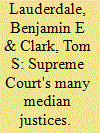| Srl | Item |
| 1 |
ID:
147240


|
|
|
|
|
| Summary/Abstract |
Empirical social science often relies on data that are not observed in the field, but are transformed into quantitative variables by expert researchers who analyze and interpret qualitative raw sources. While generally considered the most valid way to produce data, this expert-driven process is inherently difficult to replicate or to assess on grounds of reliability. Using crowd-sourcing to distribute text for reading and interpretation by massive numbers of nonexperts, we generate results comparable to those using experts to read and interpret the same texts, but do so far more quickly and flexibly. Crucially, the data we collect can be reproduced and extended transparently, making crowd-sourced datasets intrinsically reproducible. This focuses researchers’ attention on the fundamental scientific objective of specifying reliable and replicable methods for collecting the data needed, rather than on the content of any particular dataset. We also show that our approach works straightforwardly with different types of political text, written in different languages. While findings reported here concern text analysis, they have far-reaching implications for expert-generated data in the social sciences.
|
|
|
|
|
|
|
|
|
|
|
|
|
|
|
|
| 2 |
ID:
118976


|
|
|
|
|
| Publication |
2012.
|
| Summary/Abstract |
One-dimensional spatial models have come to inform much theorizing and research on the U.S. Supreme Court. However, we argue that judicial preferences vary considerably across areas of the law, and that limitations in our ability to measure those preferences have constrained the set of questions scholars pursue. We introduce a new approach, which makes use of information about substantive similarity among cases, to estimate judicial preferences that vary across substantive legal issues and over time. We show that a model allowing preferences to vary over substantive issues as well as over time is a significantly better predictor of judicial behavior than one that only allows preferences to vary over time. We find that judicial preferences are not reducible to simple left-right ideology and, as a consequence, there is substantial variation in the identity of the median justice across areas of the law during all periods of the modern court. These results suggest a need to reconsider empirical and theoretical research that hinges on the existence of a single pivotal median justice.
|
|
|
|
|
|
|
|
|
|
|
|
|
|
|
|